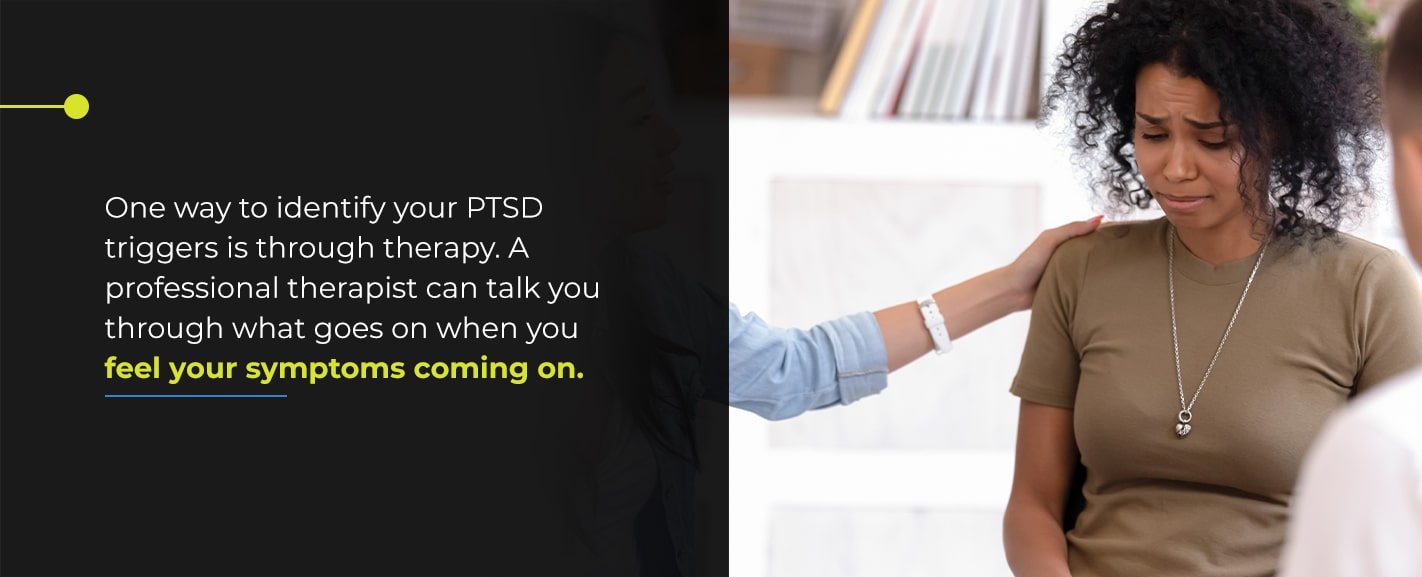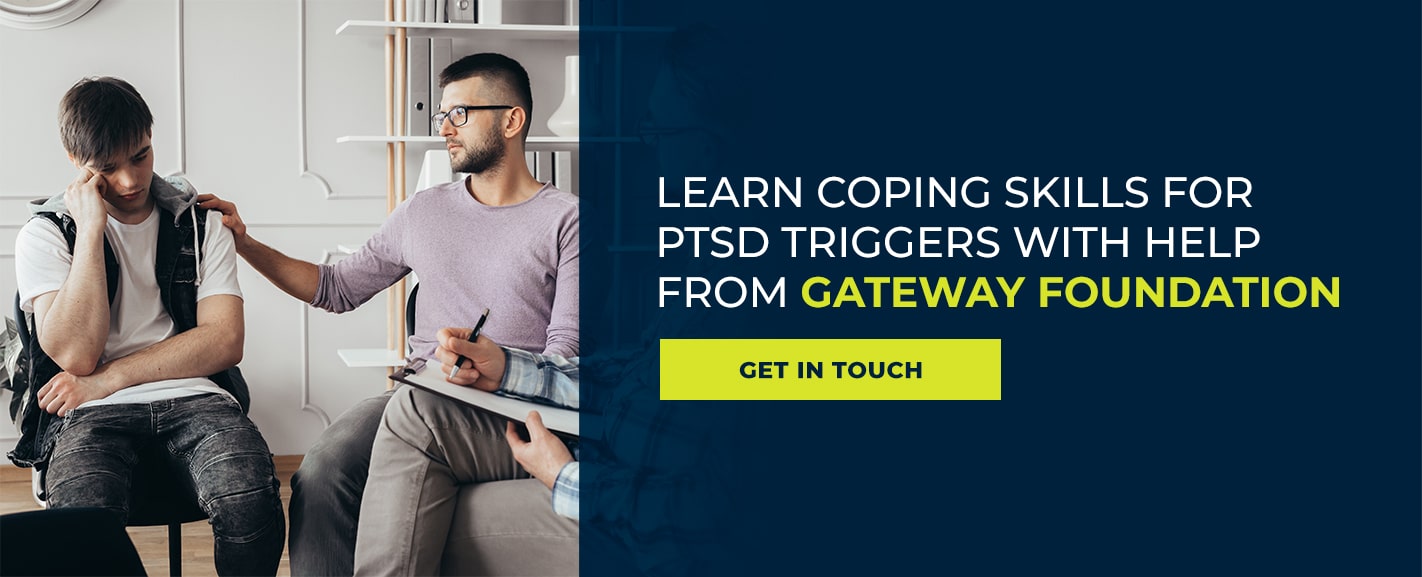- Oct 4
- Recovery
You can develop post-traumatic stress disorder (PTSD) after living through or seeing a traumatic event. Although PTSD is commonly associated with veterans returning from war, anyone can develop it. You might develop signs of PTSD after being physically attacked or witnessing a tragic car accident.
People who have PTSD often don’t have symptoms continuously. Instead, their symptoms might come and go. In certain cases, something will trigger symptoms, causing them to come on suddenly. One person’s mental health triggers might be different from another person’s, depending on their trauma experience.
Overcoming PTSD triggers means learning how to recognize them and how to avoid a triggered response. Once you know how to identify what sets off your symptoms, you can take steps towards dealing with PTSD triggers.
What Are PTSD Triggers?
The meaning of the word “trigger” has evolved somewhat in recent times. People now use it pretty casually to describe a situation that left them feeling upset or uneasy. For example, someone might say that a sad commercial triggered them or that seeing a chocolate bar triggered them to want to eat sweets.
In clinical and medical use, a trigger is a more serious event. It can be anything that sets off someone’s PTSD symptoms or causes them to relive a traumatic experience. Triggers can take many forms, including:
- Smells: Certain odors can trigger memories in a person with PTSD, causing them to feel as if they are back in the traumatic situation. A person who develops PTSD after a sexual assault might be triggered by the smell of the body spray the attacker wore. Someone who witnessed a mass shooting while eating at a restaurant might be triggered when they smell certain types of food cooking.
- Tastes: Similarly, tastes can also trigger PTSD in some people. If a tragic accident occurred during a party or picnic, the taste of certain foods, such as a hot dog or birthday cake, might trigger someone.
- Sounds: Loud bangs, tires screeching or the sounds of gunfire can trigger symptoms in people with PTSD. Someone who develops PTSD after returning from serving in a war might relive traumatic experiences when they hear a booming noise or bang. Someone who was in a car accident might feel panic when they hear tires screeching or brakes squealing.
- Sights: Images can trigger symptoms, too. In some cases, the sight of a person who looks like an attacker or the sight of an object that was nearby when someone had a traumatic experience can set off symptoms.
- Thoughts: Memories can also trigger symptoms. You might participate in an activity that brings on a memory of the traumatic event. Someone who lost a loved one while swimming might remember that experience when they go to the beach or a pool party.
- Events: Events that are similar to the traumatic event a person experienced can also serve as triggers. In some cases, the events can be simulated. A war veteran with PTSD might feel triggered when watching a film that has gruesome war scenes, or a rape survivor might be triggered when listening to someone else describe their experience of sexual assault.
- Dates: Specific dates, such as 9/11 or 7/7, might trigger PTSD symptoms in people. In some cases, the person might have been present at the event that occurred on a particular date or they might have lost someone during it.
- People: A person can be a trigger, especially if that person was in some way responsible for the traumatic experience you lived through.
On a more general level, mental health triggers can take one of two forms. They can be internal, such as thoughts and memories, or external, such as sounds or sights.
How to Identify Your Triggers
Although it might seem easy to identify PTSD triggers, things aren’t always black and white. You might have a triggered response that brings on your symptoms and not be aware of what triggered it. It’s also worth noting that not everyone with trauma has triggers.
One way to identify your PTSD triggers is through therapy. A professional therapist can talk you through what goes on when you feel your symptoms coming on. Together, you can identify the sensory experiences or memories that seem to bring on your symptoms.
In some cases, you might easily identify PTSD triggers on your own, without professional guidance. You might notice that whenever you hear brakes squealing, your body goes tense and you feel as if you transported back into a car. Or you might realize that you feel nauseated whenever you smell a particular type of food you associate with a traumatic event.
How to Deal With Trauma Triggers
Recognizing your triggers is the first step toward coping with them. How you deal with your triggers depends largely on whether they are external or internal. In some cases, it’s possible to avoid external triggers. If an individual triggers you, one option might be to cut them out of your life or avoid seeing them. If certain places or events act as triggers, you can avoid going to them.
You can learn strategies to cope with unavoidable external triggers and certain internal ones. For external triggers, cognitive behavioral therapy can be useful, as it helps you change the way you perceive and think about particular triggers.
Mindfulness techniques can help you manage triggers, too. If a thought comes into your head, practicing mindfulness can help you recognize the thought and dismiss it. Breathwork is often part of mindfulness training. Taking slow, deep breaths when you feel or think something triggering can help the feeling or thought pass without bringing on your symptoms.
It can also be helpful to have a support system or someone you can call when you experience a trigger. That person can be your therapist or a relative or a friend you trust. Your support person can help you with breathwork or distract you with other thoughts or ideas until the trigger passes.
Learn Coping Skills for PTSD Triggers With Help From Gateway Foundation
You don’t have to learn how to manage your PTSD triggers on your own. Gateway Foundation offers co-occurring and dual diagnosis services for people who are coping with PTSD and substance use disorders. We offer a range of medical and professional services to help you identify and cope with your triggers so you can live a life that’s as symptom-free as possible. To learn more about our treatment center and the services we offer, contact us today.




